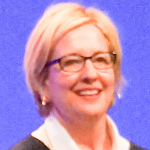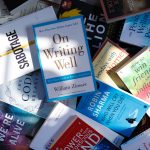READ ON TO DISCOVER:
- How to talk about your hardest struggles, without being reduced to them
- What we can do to change the way we talk about mental health
- The question to ask yourself when you need a little self-compassion
Brené Brown is a professor at the University of Houston, author of the #1 New York Times bestseller Daring Greatly, and creator of the recent Netflix special, Call to Courage. She has studied shame, worthiness, and vulnerability for over a decade, and her TED Talk on vulnerability has been viewed more than 41 million times. Brené recently sat down with world-renowned business thinker Whitney Johnson, author of Build an A-Team and host of the Disrupt Yourself podcast, to discuss the ways that we are called to courage every day.
This conversation has been edited and condensed. To listen to Brené and Whitney’s full conversation, click here.
Whitney: In one of your books, you talked about your mother and the gift that she gave your family. She seems to have made a decision to be a transitional figure in your family. Could you talk about the decisions that she made and how that influenced you?
Brené: There were so many hard decisions that she made. My grandmother was a stylist, and her husband drove a forklift at Pearl Brewery in San Antonio. My parents came from pretty tough working-class backgrounds, and my mom came from a lot of alcoholism. My grandmother had been divorced twice and was an alcoholic—that was Leave It to Beaver era [in the 1950s], and I don’t think my mom’s house was the Cleavers. [My mom] compensated for that by being the head of the drill team, and the valedictorian, and the president of different clubs.
Every family that changes direction has that person who is the fulcrum for [the change], and that was my mom. She got into therapy. She made us go. She made us talk about our feelings. She talked about what was vulnerable and hard.
The year after my parents’ divorce, [my mom’s] only sibling was shot and killed in a random act of violence. Then my grandmother, who I adored more than anyone in the whole world, more or less went crazy when Ronnie was killed. It was a horrible year. I remember telling my mom at one point, “I’m just scared. I’m not used to seeing you weak like this.” She was crying a lot and I’d never really seen her cry my entire 21 years of life. She said, “I’m vulnerable, for sure, and sad and scared, but I’m not weak. If I was a weak person, I’d be dead now.”
That was the first time I thought there was a difference between vulnerability and weakness. She transformed my life and the lives of my brother and my sisters in meaningful ways. She turned the ship.
“There is a difference between vulnerability and weakness.”
Whitney: That’s so beautiful, Brené. To say, “I’m vulnerable, but I’m not weak” is so powerful.
Brené: She’s an amazing person. It’s so fun to see her now with all of our kids. Her Christmas tree topper is an ACLU gay pride State of Liberty. She’s still no joke. Do not mess with Texas women.
Whitney: That leads us to something I wanted to ask you. In the Netflix special, you quoted Daring Greatly. I would love for you to read that [passage] out loud, and then tell us why it has so much significance for you.
Brené: Teddy Roosevelt [said,] “It is not the critic who counts, not the man who points out how the strong man stumbles, or where the doer of deeds could have done them better. The credit belongs to the man who is actually in the arena, whose face is marred by dust and sweat and blood, who strives valiantly, who errs, who comes up short again and again, and who, at the best, knows in the end the triumph of high achievement, and who, at worst, when he fails, at least does so daring greatly.”
Trending: 5 Reasons Life Gets Better After Your 40s
That says it all to me. I found it at a hard time in my career. I had just done the TEDxHouston talk on vulnerability and it was rapidly going viral—people were so grateful for having words to talk about vulnerability and courage and wholeheartedness. But along with that, as you know, come the trolls and their hatefulness. I needed to be reminded that I was in the arena, that I was trying to be brave with my life and my work, and it’s not the critic who counts.
My life changed when I read that quote. I was flooded with these beliefs: one, [that] I’m going to be in the arena, and two, that vulnerability is not weakness—it’s showing up when you can’t control the outcome.
“I needed to be reminded that I was in the arena, that I was trying to be brave with my life and my work, and it’s not the critic who counts.”
Whitney: I have had a very small taste of the [trolling] experience that you had. I wrote a piece on LinkedIn about how, based on research, women have to be two and a half times more competent than a man to be judged on equal footing.
Brené: I read it. Yes, it was so powerful.
Whitney: The trolls just came out. I felt, inside of myself, like I had been violated in some way. To your point, I think it does take a tremendous amount of courage to be in the arena. When you’re in the arena, there are people in the stands—some want to see you fail, but there are also people who are rooting you on. Can you talk a little bit about some of those people in your life?
Brené: In Dare to Lead, we do this leadership training where we talk about who is in the arena, whatever your personal arena may be. There’s always the season ticket holders—shame, scarcity, comparison. Then up high are the cheap seats, folks who will never be brave with their stuff, but will hurl hurtful stuff at you. Then there are the two most important sections in the arena—empathy and self-compassion. You have to train yourself to look for those [seats] when you’re in a hard moment.
We found in the research that you really just need one or two people, not a huge section at all. The chief holder of my empathy seat is my husband, Steve. My empathy section is not filled with “yes” people or “you’re awesome” people; it’s filled with people who love me not despite my vulnerability and imperfection, but because of them.
I have Steve and my sisters and my daughter, who is 20 now. I’ve collected a little gang of ragtag, vulnerable, wholehearted people who believe in the work and are trying to live it. It’s so easy for me, maybe for a lot of us, to dismiss what the people who matter the most say, and take in the [words of] strangers who really don’t have anything valuable to add. It’s really hard and really important to stay focused on the right group of people.
“My empathy section is not filled with ‘yes’ people or ‘you’re awesome’ people; it’s filled with people who love me not despite my vulnerability and imperfection, but because of them.”
Whitney: You’ve got this [phrase] that you say that I’ve been using all the time recently. It is “the story I am telling myself.” Where did that come from?
Brené: That phrase, or some variation, floated around in my data for probably ten years. When I did the research for Rising Strong, we [asked,] “What do the most resilient research participants that we’ve interviewed share in common?” What they share in common is a recovery bounce process. Part of that process, in every single one of these research participants, was some form of “the story I’m telling myself.” Every one of these research participants—whether they were Special Forces active-duty military or an attorney or a teacher or an artist—every one of them had the capacity and awareness to reality-check the stories they made up about what was happening.
Whitney: I’m going to give you a hypothetical. I work with the S-curve of learning framework—when you’re on a learning curve, [once] you get to the top, you jump to a new one. If you’re the manager, what would you say to a person who is reluctant to move to a new learning curve, based on your research?
Brené: I would say, “You know, Whitney, I’ve watched you over the last two years as you have really mastered the competencies and skills in this role. I see the mastery because now you’re teaching other people how to do it. I think it’s time to take on some new challenges. I think you’ve got the ability to do it. I think you’ve got the skill and time to do it, and so what I’m wondering is, what’s getting in the way? What story are you making up about leaving this competency that you’ve mastered and starting a new one? Tell me what you’re thinking.”
Whitney: Then that opens it up.
Brené: In the absence of data, we make up stories. We are a meaning-making species. It is tied all the way back to the limbic system. Stories help our brain understand how to protect us, how to take care of us. We can’t control the stories that people make up, but we can be the kind of leader that offers a space for people to check out those stories.
“In the absence of data, we make up stories . . . We can’t control the stories that people make up, but we can be the kind of leader that offers a space for people to check out those stories.”
Whitney: I had a conversation with my daughter, who is a little bit younger than yours. She’s 18 and a senior in high school.
I said, “Miranda, I’m about to talk to Brené. What would you ask her?” She said, “You know, I’d like to know how we can have a productive conversation around mental health.” This is a conversation that’s very much on the minds of all of her classmates. [When] we talk about someone who has diabetes or a broken leg, we say, “That’s bad.” But when we talk about anxiety or depression, even if we don’t say it, the subtext is that “You are bad.” What are your thoughts on that?
Trending: 5 Simple Strategies for Persuading Anybody
Brené: Well, first of all, a thousand big hearts to the fact that you have raised a daughter who’s a senior in high school and asking that question. I think having young people, like your daughter, asking that question is part of the solution. The main reason we don’t have honest conversations around mental health is shame. The difference between shame and guilt is important here—guilt is “I did something bad.” Shame is “I am bad.” When it’s a physical injury, [it’s] “I broke something.” When it’s a mental health issue, [it’s] “I am broken.”
So the more we talk about it, the more we’re honest and normalize it. One of the things that sets us back is reducing people to explain away a behavior. Harriet Lerner, who’s one of my favorite writers, says that no one wants to be defined by their hardest struggle. So we have to find this space between owning it and identifying it, but reject being labeled by it and reduced by it.
“The main reason we don’t have honest conversations around mental health is shame.”
Whitney: Do you have any thoughts on how to do that?
Brené: We need people like you and people like me, who have some wind at our backs, some success, saying out loud, “Hi, yes, I’m Brené. I’m an introvert. I can get super overwhelmed and anxious in big groups. I can speak in front of 10,000 people, that’s not a big deal, but if I have to go to a party where there’s 30, I can do anything to get out of it because I get really anxious in those social settings.” We need people to tell their stories.
If you’re in a room and someone says, “You know, Whitney, I don’t know what happened to her. Maybe she had one of those anxiety things she has sometimes,” I need you to say, “You know what, that’s not my experience of Brené. And I’m not comfortable with you using something she shared against her to explain her behavior.”
Whitney: I teach a group of girls at our church who are 16 and 17 years old, and one of the things that came up the other day is depression and anxiety. I said, “Well, I struggle with depression. I struggle with anxiety.” We can destigmatize it when we’re willing to talk about our own struggles, and then we [avoid] reducing people to that thing that they struggle with.
Brené: “We contain multitudes,” Walt Whitman [said], “I am large. I am a lot of different things, defined by none of them.”
Whitney: You said, “Joy is the most vulnerable of all emotions.” What about your work and your life gives you deep joy?
Brené: I’ve been thinking about that a lot. One of the things that I talk about in The Gifts of Imperfection is [making] a “joy list,” by [asking] yourself, “What’s going on in your life when you’re your happiest?”
[Personally,] I’m cooking, practicing photography. I’m editing photos. I’m making family albums. I am praying and meditating. I’m with my family, I’m near water.,I’m hiking. All of those things bring me intense joy. [But when] I came across my joy list a couple of weeks ago, I realized I wasn’t doing almost anything on it.
Whitney: So when you read the list, you started to make changes?
Brené: I’m definitely making changes. What I realized, in these last six months, is that I’m more joyful and my work is more meaningful when I am slower and closer. For me, a big business learning for me was that I need to find great partners who are scalers, who can go further and faster. But the way I spend my days has to be about slower and closer.
I’m at the place now where I’m trying to inhale and ask myself, “Am I doing this to prove that I can, or because I want to and it brings me joy?” Those two things are not the same all the time for me.
“I’m more joyful and my work is more meaningful when I am slower and closer.”
Whitney: For most of us, no.
Trending: 40 Nonfiction Books to Look Out for in 2024
Brené: Now I’m really trying to make sure that when a new project comes along or when a new opportunity comes my way, instead of looking at what it could do for the work and the platform, I ask myself, “If I say yes, what are my next 180 days going to look like?”
Whitney: It sounds to me like this is a new arena moment for you.
Brené: It really is. I hate it. I just want to sit in the stands and have some popcorn and kick back for six months. But, I think I need to be intensely and joyfully in my life in order to write about things that are meaningful for people. Does that make sense?
“I need to be intensely and joyfully in my life in order to write about things that are meaningful for people. ”
Whitney: It makes complete sense. You now know you’re capable of scaling. You know that people want it to scale. But the question you’re asking yourself is, “What does that look like for you?”
There’s some piece of you that wants to prove that you can do it yourself, but then that pulls you back into the trap of “Am I worthy?” You’re trying not to be called by the siren song of wanting to be worthy, and saying, “What actually makes Brené happy?” And that’s…
Brené: That’s hard! One of the things about self-compassion that helps me is to ask, “Am I talking to myself like I talk to someone I love?”
If I make a mistake, or I’m trying to practice self-care, I reflect and ask if that is how I would talk to Ellen, [if she were] embarking on something. 90% of the time, I would never say [the things I say to myself] to Ellen.
“Am I talking to myself like I talk to someone I love?”
Whitney: Here’s my final question. It is 180 days from now. What will it look like if you can say, “I was brave, and I won”?
Brené: Keep showing up for the hard stuff and the hard decisions and the hard conversations. I am not just teaching and writing my own work; I’m living my work. I’m at water polo games and reading books and working out and fighting the fight in a way that makes me feel spiritually grounded.
Whitney: You’re whole.
Brené: I’m whole.
Ready for more big ideas like this? Join the Next Big Idea Club today!





























